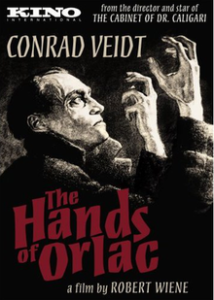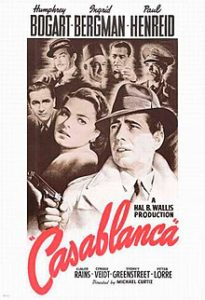The Hands of Orlac [Orlacs Hände] ***** (1924, Conrad Veidt, Alexandra Sorina) – Classic Movie Review 12,086
Conrad Veidt stars in director Robert Wiene’s splendid pioneering 1924 Austrian silent classic Expressionist horror film The Hands of Orlac [Orlacs Hände] as Paul Orlac, a concert pianist who loses his hands in a railway accident. But a surgeon transplants the hands of a man who has recently been executed for murder, named Vasseur, seeming to compel Orlac to violence and the desire to kill.
Orlac’s new hands cannot play the piano, so he and his wife Yvonne (Alexandra Sorina) run out of money. Orlac goes to see his father for help, but finds he has been stabbed to death with a knife like Vasseur’s, and starts to think he himself committed the murder. Then he meets a man who claims he is Vasseur.
The handy plot is based on the 1920 book Les Mains d’Orlac by Maurice Renard, written for the screen by Louis Nerz. A box office and critical success, the thrillingly imaginative film continues to be one of the most critically acclaimed Austrian-produced films. It is one of the first films to feature hands with a will of their own, as well as playing on popular fears about surgical transplants in the days before they were possible.
It was shot at the studios of Listo-Film in Vienna by the Pan-Film production company. The sets are built by film architects and set builders Hans Rouc, Karl Exner, and Stefan Wessely.
It was first released 6 May 1924 in Austria and several months later in Germany on 24 September 1924 at 92 minutes, with footage cut because of censorship. In June 1928, it premiered in the US with an entire reel edited out, prompting a mixed reviews.
The Hands of Orlac was incomplete for decades, because of the footage cut from the American prints and footage that had been cut through censorship in Austrian and German prints. But in 1995, the film was restored to its original length by Bundesarchiv-Filmarchiv in Berlin, Friedrich-Wilhelm-Murnau-Stiftung and the Deutsches Filminstitut with the co-operation of Jugoslovenska Kinoteka in Belgrad. This version had new music by Henning Lohner and was also given background noises and the sound effects of an interrogation scene.
A new restoration based on the 1995 version was released on Region 1 DVD in 2008 by Kino Lorber, restored by Bret Wood, with a score by composer Paul Mercer and additional footage courtesy of The Raymond Rohauer Collection in Columbus, Ohio and took the running time to 110 minutes.
In 2013 Filmarchiv Austria restored the film with material from its archives, running 93 minutes, with a score composed by Donald Sosin, performed by the composer at the piano and Dennis James at the Rieger organ. The 2013 restoration (105 minutes), with a score by Johannes Kalitze, was released on Blu-ray in Germany in 2019 and in the UK in 2021.
This film and all others produced in 1924 entered the US public domain in 2020.
The film has been remade three times: as Mad Love (1935) directed by Karl Freund, The Hands of Orlac (1960) and the low-budget Hands of a Stranger (1962) directed by Newt Arnold. Also Body Parts (1991) draws on Renard’s story, plus The Beast with Five Fingers (1946), The Crawling Hand (1963), The Hand (1981) directed by Oliver Stone, and Les Mains de Roxana (2012).
Wiene had made his name as a director of Expressionist films such as The Cabinet of Dr Caligari (1920), also with Conrad Veidt.
The cast are Conrad Veidt as Paul Orlac, Alexandra Sorina as Yvonne Orlac, Fritz Kortner as Nera, Carmen Cartellieri as Regine, Hans Homma as Dr Serra, Fritz Strassny as Paul’s father, and Paul Askonas as Servant.
Berlin-born Conrad Veidt his new Jewish wife Ilona Prager were forced to flee Germany in 1933 when the Nazis came to power. They settled in Britain and Veidt became a British citizen in 1939, appearing in many British films including The Thief of Bagdad (1940). He emigrated to the US in 1941 and played Major Strasser in Casablanca (1942).
Veidt fervently opposed the Nazi regime and later donated a major part of his fortune to Britain to assist in the war effort.
Veidt made his name as a murderous somnambulist in Robert Wiene’s The Cabinet of Dr Caligari (1920) and starred in other silent horror films such as The Student of Prague (1926) and Waxworks (1924). Veidt also appeared in Magnus Hirschfeld’s 1919 film Anders als die Andern [Different from the Others], one of the earliest films to portray homosexuality sympathetically. He had a leading role in Germany’s first talking picture, Das Land ohne Frauen [Land without Women], in 1929.
His starring role as a disfigured circus performer whose face is cut into a permanent grin in The Man Who Laughs (1928) provided the visual inspiration for the Joker in Batman.
© Derek Winnert 2022 Classic Movie Review 12,086
Check out more reviews on http://derekwinnert.com



